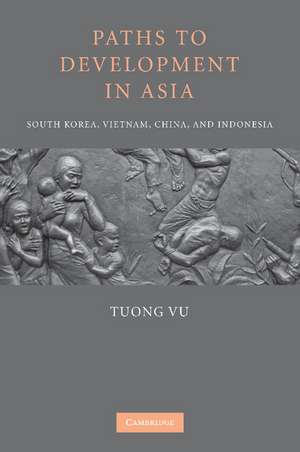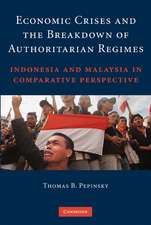Paths to Development in Asia: South Korea, Vietnam, China, and Indonesia
Autor Tuong Vuen Limba Engleză Paperback – 2014
| Toate formatele și edițiile | Preț | Express |
|---|---|---|
| Paperback (1) | 288.25 lei 6-8 săpt. | |
| Cambridge University Press – 2014 | 288.25 lei 6-8 săpt. | |
| Hardback (1) | 720.17 lei 6-8 săpt. | |
| Cambridge University Press – 21 mar 2010 | 720.17 lei 6-8 săpt. |
Preț: 288.25 lei
Nou
Puncte Express: 432
Preț estimativ în valută:
55.16€ • 57.38$ • 45.54£
55.16€ • 57.38$ • 45.54£
Carte tipărită la comandă
Livrare economică 12-26 aprilie
Preluare comenzi: 021 569.72.76
Specificații
ISBN-13: 9781107618107
ISBN-10: 110761810X
Pagini: 314
Ilustrații: 1 b/w illus. 6 tables
Dimensiuni: 152 x 229 x 18 mm
Greutate: 0.46 kg
Editura: Cambridge University Press
Colecția Cambridge University Press
Locul publicării:New York, United States
ISBN-10: 110761810X
Pagini: 314
Ilustrații: 1 b/w illus. 6 tables
Dimensiuni: 152 x 229 x 18 mm
Greutate: 0.46 kg
Editura: Cambridge University Press
Colecția Cambridge University Press
Locul publicării:New York, United States
Cuprins
Part I. Divergent National Paths of State Development: 1. State formation dynamics and developmental outcomes; 2. South Korea: confrontation and the formation of a cohesive state; 3. Indonesia: from accommodation to confrontation; 4. Rival state formations in China: the republican and Maoist states; 5. Vietnam: accommodation and arrested revolution; Part II. Variants of Accommodation: Vietnam and Indonesia Compared: 6. Organizing accommodation in Vietnam: coalition government, united front, and the Leninist party; 7. Organizing accommodation in Indonesia: parliament and status-based parties; 8. Talking accommodation in Vietnam: nation, the people, and class struggle; 9. Talking accommodation in Indonesia: nation, the people, God, and Karl Marx; 10. Rethinking developmental states; Bibliography.
Recenzii
'… the main strength of Paths to Development in Asia is its careful attention to how political organization and political discourse operated in the decade-and-a-half after the Second World War in Vietnam and Indonesia. In doing so, Vu demonstrates convincingly how accommodation, mass incorporation and elite compromise impeded the creation of effective developmental sates in these two countries.' South East Asia Research
'Paths to Development in Asia stands out for its attention to history and belief in its importance; for incorporating socialist states into the concept of developmental states, a valuable move; and for its depressing lessons - above all that successful developmental states are born in bloodbaths. It makes clear the contingency of democracy and the importance of a comparative historical approach.' Scott L. Greer, Democratization
'Paths to Development in Asia stands out for its attention to history and belief in its importance; for incorporating socialist states into the concept of developmental states, a valuable move; and for its depressing lessons - above all that successful developmental states are born in bloodbaths. It makes clear the contingency of democracy and the importance of a comparative historical approach.' Scott L. Greer, Democratization
Descriere
Focuses on state structure and formation, arguing that a cohesive state structure is as important as effective industrial policy in developmental success.
















